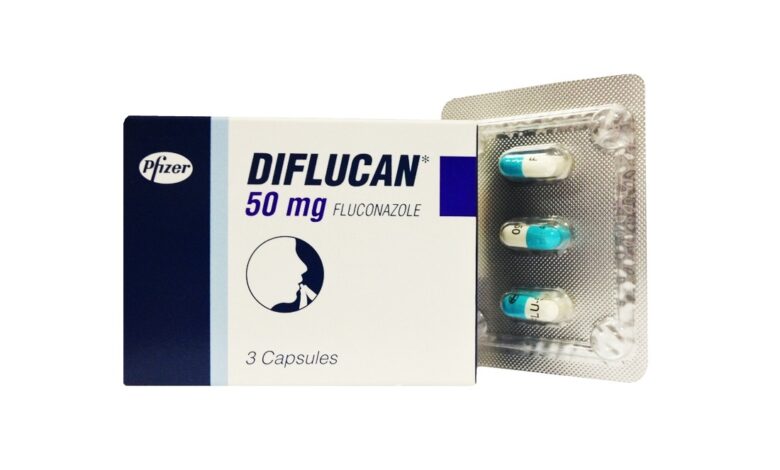How Long Does It Take For Fluconazole (Diflucan) To Work?

Fluconazole is a prescription drug. It comes as a tablet or suspension you take by mouth. Fluconazole oral tablet is available as both a generic drug, and as the brand-name drug Diflucan. Fluconazole is in the azole antifungal family of medication. Fluconazole was patented in 1981 and came into commercial use in 1988. It is on the World Health Organization’s List of Essential Medicines.
Fluconazole is used to prevent and treat candidiasis. This condition is caused by infection with one of the many types of the fungus Candida. Examples of candidiasis include vaginal yeast infection, as well as oral yeast infection (thrush).
Candidiasis can also cause infections on other parts of your body, including your throat, esophagus, lungs, and blood. People who have had bone marrow transplants may be treated with fluconazole to prevent candidiasis. This is because their immune systems are weakened, which makes them more likely to become infected with a severe form of candidiasis. Fluconazole is also used to treat meningitis (infection of the brain and spinal cord) that’s caused by the fungus Cryptococcus.
How it works
Like earlier stated, Fluconazole belongs to a class of drugs called triazole antifungals. A class of drugs is a group of medications that work in a similar way. These drugs are often used to treat similar conditions. Fluconazole works by blocking the ability of the fungi Candida and Cryptococcus to reproduce. For people with infections from these fungi, this drug helps to get rid of the infection. For people at higher risk of candidiasis, it helps to prevent infection.
How should fluconazole be used?
Fluconazole comes as a tablet and a suspension (liquid) to take by mouth. It is usually taken once a day, with or without food. You may need to take only one dose of fluconazole, or you may need to take fluconazole for several weeks or longer. The length of your treatment depends on your condition and on how well you respond to fluconazole. Follow the directions on your prescription label carefully, and ask your doctor or pharmacist to explain any part you do not understand. Take fluconazole exactly as directed. Do not take more or less of it or take it more often than prescribed by your doctor.
Your doctor may tell you to take a double dose of fluconazole on the first day of your treatment. Follow these directions carefully.
Shake the liquid well before each use to mix the medication evenly.
You should begin to feel better during the first few days of treatment with fluconazole. If your symptoms do not improve or get worse, call your doctor.
Continue to take fluconazole until your doctor tells you to stop, even if you feel better. Do not stop taking fluconazole without talking to your doctor. If you stop taking fluconazole too soon, your infection may come back after a short time.
Ask your pharmacist or doctor for a copy of the manufacturer’s information for the patient.
How long does it take for fluconazole (Diflucan) to work?
Fluconazole (Diflucan) starts to work within 7 days of taking the medication although it may take about 1 to 2 weeks before it reaches its full effect. For most fungal infections such as vaginal thrush, balanitis or oral thrush this time limit holds.
If symptoms continue despite appropriate treatment, fluconazole may be prescribed for everyday use for ten to fourteen days, and even continued once per week for six months.
What are side effects of Fluconazole?
Fluconazole may cause serious side effects including:
• fast or pounding heartbeat,
• flutter in your chest,
• shortness of breath,
• sudden dizziness,
• fever,
• chills,
• body aches,
• flu symptoms,
• easy bruising or bleeding,
• unusual weakness,
• seizure (convulsions),
• skin rash or lesions,
• loss of appetite,
• upper stomach pain,
• dark urine,
• clay-colored stool, and
• yellowing of eyes or skin (jaundice)
Get medical help right away, if you have any of the symptoms listed above.
The most common side effects of Fluconazole include:
• nausea,
• stomach pain,
• diarrhea,
• upset stomach,
• headache,
• dizziness, and
• changes in your sense of taste
Tell the doctor if you have any side effect that bothers you or that does not go away. These are not all the possible side effects of Diflucan. For more information, ask your doctor or pharmacist.
Call your doctor for medical advice about side effects. You may report side effects to FDA at 1-800-FDA-1088.
What other drugs will affect fluconazole?
Sometimes it is not safe to use certain medications at the same time. Some drugs can affect your blood levels of other drugs you take, which may increase side effects or make the medications less effective.
Fluconazole can cause a serious heart problem. Your risk may be higher if you also use certain other medicines for infections, asthma, heart problems, high blood pressure, depression, mental illness, cancer, malaria, or HIV.
Many drugs can affect fluconazole, and some drugs should not be used at the same time. Tell your doctor about all your current medicines and any medicine you start or stop using. This includes prescription and over-the-counter medicines, vitamins, and herbal products.





